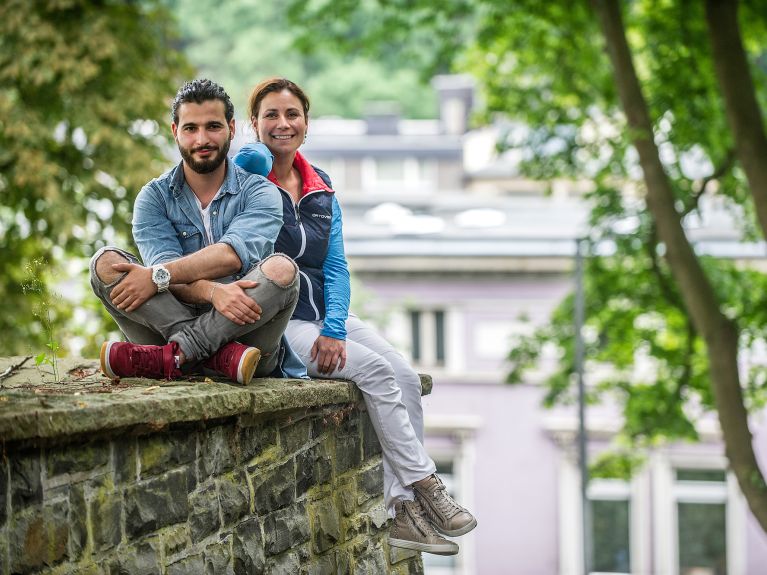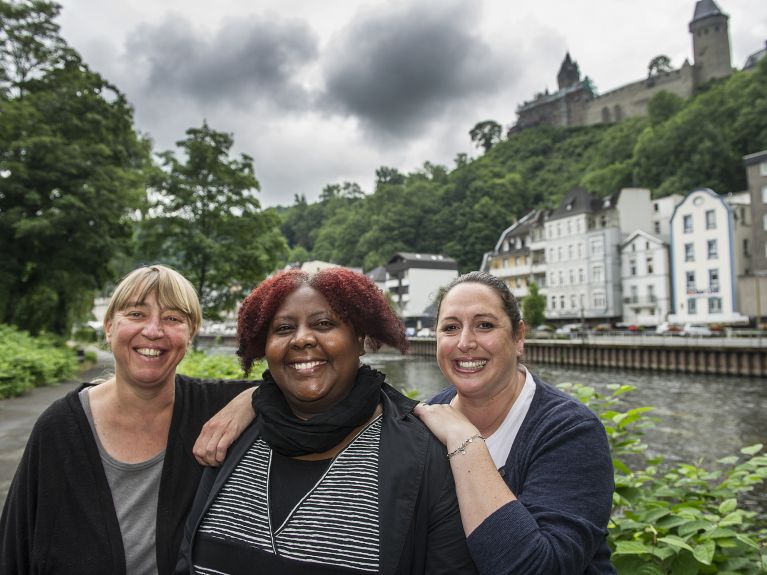Lots of new neighbours
Altena has taken far more refugees than it was assigned, and has integrated them in exemplary fashion – even winning an award from the German chancellor in the process.

Arriving too late, Nicole Möhling apologises – she has spent two hours waiting at the ophthalmologist’s with Anas Al-Srouji. “The problems with his right eye are not as severe as feared – thank goodness.” Möhling has been helping the young Syrian for more than a year and a half. The 41-year-old from Altena in North Rhine-Westphalia is one of the 35 women and men in the town who have agreed to act as sponsors for refugees. In her eyes, Al-Srouji has long since become more than someone who simply needs support with official matters and doctors’ appointments or with finding a place to live. “He is part of the family, and comes and goes as he pleases in our house.”
Dieses YouTube-Video kann in einem neuen Tab abgespielt werden
YouTube öffnenThird party content
We use YouTube to embed content that may collect data about your activity. Please review the details and accept the service to see this content.
Open consent formSo why did Nicole Möhling get involved? “I wanted to know who was coming to our town”, she explains. “I also tried to imagine how I would feel if I ended up as a refugee, stranded in a foreign place. With nothing – and without understanding a word.” Anas Al-Srouji nods. The 24-year-old now understands German pretty well, though he still has some problems speaking it. “I was so lucky to meet the people here”, he says. Previously he was housed in Halberstadt in (the former East German state of) SAXONY-ANHALT. He experienced hostilities there and did not feel comfortable.
A small green town by a castle on a hill
His new home town of Altena in the Sauerland region advertises itself as a “town for all generations”. It takes its name from Altena Castle, which is situated just above the town. The river Lenne winds its way through the small green town with its 17,300 or so inhabitants. The next major town is Hagen, around 30 kilometres away.
The number of refugees in Germany soared in 2015, sparking a heated public debate. Many local authorities could hardly cope and found themselves stretched to the limit when trying to take care of and accommodate the influx of refugees. A whole series of town mayors sounded the alarm bells, warning that it was impossible to take any more people.
It was around this time that the mayor of Altena caused a stir when his town voluntarily took an additional 100 refugees on top of the 270 it had already been assigned. As Andreas Hollstein puts it, Germany coped with problems on an entirely different scale following the Second World War. Mayor Hollstein appealed for people to think objectively about what the so-called “flood of refugees” really means. To critics, he argues as follows: “If 80 people are sitting in the pub here and one Syrian comes and joins them, that is hardly a question of being ‘inundated with foreigners’.”
I tried to imagine how I would feel if I ended up as a refugee, stranded in a foreign place. With nothing – and without understanding a word.
“We felt knighted”
Integration has proved successful in Altena, and the town’s activities in this area are regarded as exemplary. In May 2017, German Chancellor Angela Merkel presented the town with the National Integration Award of the Federal Government, a prize endowed with 10,000 euros that was awarded for the first time. Nicole Möhling was part of the group that accepted the award on behalf of many others at the Federal Chancellery in Berlin. “Although it may sound a bit strange”, she says, “we felt as if we had been knighted.”
Ever since, academics from all over the world have been studying the way integration is done in Altena. The Organisation for Economic Co-operation and Development (OECD) even sent a delegation to the small town in the Sauerland to find out what it does better than other places.
Togetherness is what counts
The migration researchers certainly will not find any concepts officially set down in writing. There is no “formula for success” – the key is the interplay of different factors, say those responsible. One important role is played by the “Stellwerk”, a municipal institution that interweaves the voluntary activities with the town hall’s integration policy.
Anette Wesemann runs the “Stellwerk”. She has a degree in education and is well aware of the daily challenges involved in integration. She also knows how much work is associated with each refugee’s individual fate, and which disappointments the voluntary helpers experience. “They feel terrible and really sad when – as happened just recently – a family they have been supporting is deported to Afghanistan after spending more than a year in Altena. Everyone feels this pain.”
No-one should fall through the net
Samira Lorsbach and Nadja Mehari nod. The two women are the points of contact for refugees who have any kind of questions – one is employed while the other is a volunteer. They feel responsible for the people. Altena does not leave “its” refugees – currently numbering around 450, predominantly from Syria, Eritrea and Iraq – alone when they arrive in the town. The staff and helpers find them places on language courses, give them careers advice, maintain contact with social services, the youth welfare office and the job centre. It helps that the people working in the various authorities know each other, and that all are located close by.
It is a mistake to measure integration in terms of months. It is a process that is bound to take several years.

Another thing that sets Altena apart from other towns is that refugees are not housed in large facilities but are spread all over the town. This allows them to come into contact more easily with their neighbours. There is no shortage of space in Altena, as more than one in ten flats is vacant. No town in North Rhine-Westphalia has shrunk as dramatically over the past decades. Altena, where the wire production industry used to be the main employer, had around 32,000 inhabitants in 1970. Today’s population is only somewhat over half this size.
This is also one reason why the mayor decided to take more refugees than it was assigned – he saw it as an opportunity for the town to grow again. Abusive e-mails make it quite clear that not everyone welcomes this step, but Hollstein takes it all in his stride. He believes that even the scheme’s opponents will understand sooner or later that it was the right thing to do: “It is a mistake to measure integration in terms of months. It is a process that is bound to take several years.”


